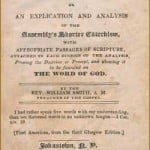This is one of those days where few Presbyterian events seem to have happened. In a previous year we wrote of how John and Louisa Lowrie set sail for the mission field in India on this date. This year, we wanted to discuss something more of Rev. Lowrie’s wife, Louisa. The following brief account is drawn from the Centenary Memorial of the Planting and Growth of Presbyterianism in Western Pennsylvania and Parts Adjacent (1876), p. 194:—
Louisa A. Lowrie, wife of the Rev. John C. Lowrie, D.D. was a daughter of Thomas and Mary Wilson, of Morgantown, Virginia [later of West Virginia, which became a state in 1863], and sister of the late Hon. Edgar C. Wilson, of the same place. She belonged to the first band of missionaries sent by the Pittsburgh Society to India, and sailed from Philadelphia on May 30, 1833. She died in Calcutta, November 21, of the same year, in the twenty-fourth year of her age.
The annual report of 1834 says of her : “Her desires to devote herself to the spiritual good of the heathen were fervent, and her qualifications for the work were, to human view, uncommon; but He for whose glory she left her native land and bore her feeble exhausted frame half round the globe, was pleased, doubtless for wise reasons, to disappoint her earthly hopes, and require her associates, a few short weeks after their arrival, to consign her to the dust, there to proclaim, as she sleeps in Jesus on India’s distant shores, the compassion of American Christians for its millions of degraded idolators, and to invite others from her native land to come and prosecute the noble undertaking in which she fell.”
Her pastor at Morgantown, Rev. Ashbel G. Fairchild, D.D., prepared a memoir, soon after her death; and few who have seen in it the excellent likeness of that lovely face will ever forget it. Her memory was still affectionately cherished in Western Pennsylvania for many years after. The Women’s Missionary Society of the Presbyteries of Pittsburgh and Allegheny eventually built a house at Mynpurie, India, naming it her memory, “The Louisa Lowrie Home.” It’s purpose was to serve as a dwelling for unmarried women laboring as missionaries at that particular station.
A few years before her death, Louisa Lowrie wrote the following in her journal:—
Saturday, June 11th. (1831).—In reviewing my life for a year past, I find so much for which to praise the Lord, that I feel oppressed with a sense of my ingratitude. Mercies unnumbered have crowned this year, the most blessed of my life. In it, the Lord has changed my heart; and given me to feel that Jesus is my friend; and, as often as I have wandered from Him, He has drawn me back by mercies or chastisements. During the last autumn my way was so clear, the current of my life so smooth, and my path so strewed with flowers, that I almost feared I was not one of those who should “come out of great tribulation.”In examining my views and feelings, I find that I am very much changed. I can scarcely recognize my former self. Added to a disposition naturally cheerful, I possessed an intense desire for happiness; and perhaps enjoyed as much as was ever felt by an unregenerate heart. But, in the midst of all, I found there was something wanting, without which I could not rest. The Lord gave me to see that this was religion. I sought religion–I tasted of his love; and found that all I had hitherto enjoyed was nothing;—mere negative happiness. I desired to love the Lord with my whole soul. I cared not what should befall me; I only asked holiness of heart. Oh, my God! thou knowest I was sincere; and if I have since murmured against thee, on account of the means thou hast employed to subdue me, forgive I beseech thee—pity my feeble frame! I do not ask theee to lessen my sufferings; I only ask suffering grace.

